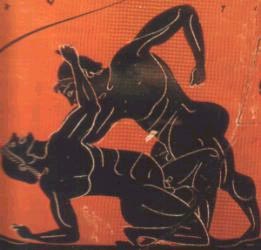



Areté / Areta
Manhood
Manly Virtue
Manhood, excellence, goodness, virtue
Although this ancient Greek word is often translated as "excellence";
it also carries the meaning of Manhood, Virtue, Goodness, Nobility, and Valour.
As UC Berkeley Prof Stephen Miller says in his book Areté: Greek Sports from Ancient Sources,
[Areté] is a word for which we have no simple equivalent in English. Areté includes the concepts of excellence, goodness, manliness, valor, nobility, and virtue. It existed, to some degree, in every ancient Greek and was, at the same time, a goal to be sought and reached for by every ancient Greek.
What's important for us to understand is that the word and concept of areté, which is one of the most important in ancient Greek culture, derives from Ares, the Greek God of War, the Warrior God --
as is explained in Liddell and Scott's Ancient Greek Lexicon:
From the same root [ARES] comes areté ... the first notion of goodness being that of manhood, bravery in war; cf. Lat. virtus.
And, Liddell and Scott re-inforce that point by saying that areté is
goodness, excellence, of any kind, esp. of manly qualities, manhood, valour, prowess, Hom., Hdt. (like Lat. vir-tus, from vir).
Which means that for the Greeks, Fighting and Fighting Spirit -- Manhood -- are core to Excellence.
And thus to Virtue.
Further, in his Symposium, Plato argues that male-male Eros is the Love of Areté.
Which means that Eros is, at least on one level, the Love of Fighting Spirit.
The Love of Manhood.
Moreover, Xenophon, in *his* Symposium, presents Sokrates as making a similar argument:
But as for you, Callias, all the city knows that you are in love with Autolycus, [a recent victor in pankration], and so, I think, do a great many men from abroad. The reason for this is the fact that you are both sons of distinguished fathers and are yourselves in the public eye.
Now, I have always felt an admiration for your character, but at the present time I feel a much keener one, for I see that you are in love with a person who is not marked by dainty elegance nor wanton effeminacy, but shows to the world physical strength and stamina, virile courage [andreia -- manliness, manhood, manly spirit] and sobriety [sophrosyne -- self-control]. Setting one's heart on such traits gives an insight into the lover's character.
"physical strength and stamina, virile courage and sobriety" --
And the words translated as "virile courage" and "sobriety" actually just mean --
"manliness" -- the ability and willingness to fight -- and "self-control" --
Manhood.
And the great classicist Werner Jaeger, in his magisterial Paideia: The Ideals of Greek Culture, says that "Areté denotes the strength and skill of a warrior or athlete, and above all his heroic valour."
His Heroic Valour -- His Fighting Manhood.
And, following Plato, Jaeger links Male Eros -- that is, the Love of Man for Man -- to the Love for Areté:
It is very significant that the first time we have an opportunity of studying the Dorian [Spartan] aristocracy closely we should find that homosexual love is the ruling motive in their character.
...
It is, after all, easy to understand how a passionate admiration of noble bodies and balanced souls could spring up in a race which for countless years had prized physical prowess and spiritual harmony as the highest good attainable by man, and which had striven by grave and ceaseless rivalry, by exertion involving the utmost energies of mind and body alike, to bring those qualities to the greatest possible perfection. Men who loved the possessors of those enviable qualities were moved by an ideal, the love for areté. Lovers who were bound by the male Eros were guarded by a deeper sense of honour from committing any base action, and were driven by a nobler impulse in attempting any honourable deed.
The Spartan state deliberately made Eros [male-male love] a factor, and an important factor, in its agogé.
"Men who loved the possessors of those enviable qualities [-- "noble bodies and balanced souls" -- "physical prowess and spiritual harmony" -- ] were moved by an ideal, the love for areté."
The Love for Manhood.
Indeed, Jaeger, referring to nude Greek athletics and the ideals of the Dorian Greek aristocracy, speaks explicitly of "Men struggling to bring their Manhood to perfection."

So:
Among the Greeks, Areté, often translated as Virtue, Goodness, or Excellence, reduces to --
Manhood.
Fighting Manhood.
That ancient Greek ideal is, to be sure, a conception of Manhood which we have lost -- a Moral Manhood, a Virtuous Virility.
But that's our loss.
To the Greeks, "moral" and "virtuous" went without saying.
Which is why:
Among the Greeks, Areté, often translated as Virtue, Goodness, or Excellence, reduces to --
Manhood.
Because, as Liddell and Scott say,
the first notion of goodness [is] that of manhood, bravery in war; cf. Lat. virtus.
The first notion of Goodness -- is Manhood.
Finally, Areté is both Manhood and an Ideal of Manhood.
Areté was and remains an Ideal of Manhood, of Manly Excellence, Manly Goodness, and Manly Moral Beauty -- which *every* Man spends a lifetime Fighting to achieve.
Classicist CM Bowra:
The aristocratic ideal of manhood was wide and generous. It did not restrict "goodness" to a specific field of behavior, but simply expected a man to be in every sense a man.
In The Man2Man Alliance, we too expect a Man to be in every sense -- a Man.
See also:
And these Man2Man Alliance articles:
AGOGE IV: Excellence, Honor, and the Molding of Men;
AGOGE VI: The Strife of Valour: Austerity and Equality at Sparta; and
And, most importantly,
